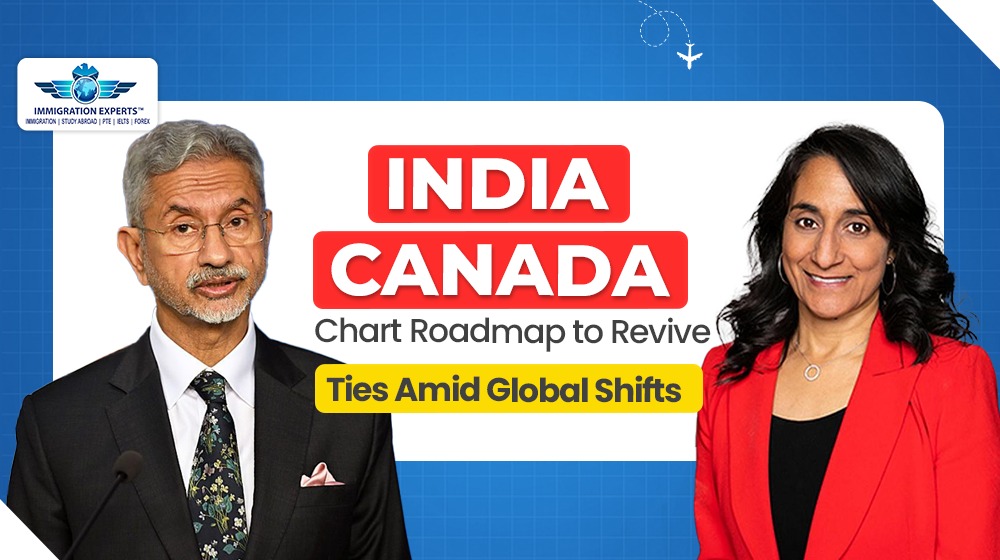
India and Canada Set a New Roadmap to Strengthen Partnership
India and Canada have taken a major step to restore and strengthen their bilateral relationship. The announcement comes after Canadian Foreign Minister Anita Anand met Indian Prime Minister Narendra Modi and Foreign Minister Subrahmanyam Jaishankar in New Delhi. Leaders from both countries have described the plan as a “new roadmap” aimed at resetting relations and enhancing cooperation on multiple fronts.
Check Your Skilled Assessment & Eligibility
A Fresh Start in Bilateral Relations
The joint statement issued by Anand and Jaishankar outlines specific measures to “restore stability in the relationship.” This roadmap comes after a series of challenging years, including a diplomatic fallout triggered by the 2023 assassination of Sikh separatist Hardeep Singh Nijjar in Surrey, B.C. The event had led to allegations and counter-allegations, causing a temporary rupture in Canada-India relations.
The new plan emphasizes mutual respect, adherence to democratic values, and a commitment to sovereignty and territorial integrity. It signals that both countries are ready to move past the difficulties and focus on constructive engagement.
Key Areas of Cooperation
The roadmap identifies several sectors for collaboration:- Trade and Investment: Both countries plan to revive two-way trade in liquefied natural gas (LNG) and strengthen agricultural supply chains. They also aim to reinvigorate the Canada–India CEO Forum to bring together business leaders.
- Climate and Energy: Canada and India will cooperate on climate action initiatives, renewable energy projects, and sustainable development.
- Artificial Intelligence and Technology: The roadmap encourages partnerships in AI, innovation, and emerging technologies.
- Higher Education: A “refreshed collaboration” in higher education will enhance student exchanges, research partnerships, and academic cooperation.
Prime Minister Modi and Foreign Minister Jaishankar highlighted the importance of building momentum in the relationship, especially during times of global economic uncertainty and rising geopolitical tensions.
Diplomatic Engagements
The renewed dialogue follows multiple high-level engagements over the past months. Canadian Prime Minister Mark Carney met Prime Minister Modi at the G7 Summit in Kananaskis, Alberta, in June. These discussions laid the groundwork for Anand’s visit to India.
Anand’s meetings with Modi and Jaishankar mark a multiday diplomatic stopover before she heads to China to continue her international outreach. During her visit, she aims to ease economic tensions caused by trade disputes, including those affecting Canada’s canola and electric vehicle sectors.
Addressing Past Challenges
Relations between India and Canada had reached a low point after the Nijjar assassination. Former Canadian Prime Minister Justin Trudeau had publicly accused India of involvement, which India denied. This led to a diplomatic standoff, including the recall of multiple diplomats from both countries.
The new joint statement directly addresses such concerns, emphasizing that any encroachment on sovereignty is unacceptable. It reflects a commitment to moving forward while safeguarding the principles of law, order, and mutual respect.
Economic Context and Global Pressures
Global economic pressures have played a significant role in accelerating the rapprochement. Both Canada and India face challenges from U.S. protectionist trade measures. Canada has been negotiating relief from high tariffs on steel, aluminum, automobiles, and forestry products. India is dealing with a 50% U.S. tariff on goods due to its continued purchase of Russian oil and weapons.
These pressures have prompted both countries to diversify their economic and strategic partnerships. The Canada-India roadmap aims to mitigate vulnerabilities arising from shifting global alliances and strengthen resilience in trade and investment.
Law Enforcement and Security Cooperation
Security and law enforcement are also central to the renewed partnership. India has committed to cooperating with Canadian police investigations, sharing information, and supporting joint efforts to address transnational criminal activities. Recent high-profile arrests in Canada of individuals linked to extremist movements in India demonstrate the ongoing collaboration.
The joint statement highlights the importance of law enforcement dialogue as part of the broader bilateral engagement. It underscores that shared security and intelligence cooperation will remain a cornerstone of Canada-India relations.
Expert Opinions
Peter Jones, a professor at the University of Ottawa, described the roadmap as a “significant step” that goes beyond rhetoric. “This isn’t just, ‘Well, we’d like to get along better.’ This is a set of things they actually plan to do,” he said. He noted that behind-the-scenes discussions have been ongoing for months, reflecting a serious commitment from both sides.
Moving Forward with a Positive Mindset
Foreign Minister Jaishankar emphasized that India’s approach is to move forward with positivity. Social media posts from Anand highlight Canada’s focus on energy, trade, AI, and law enforcement cooperation. Both countries have recently reinstated high commissioners, further symbolizing the intention to restore normal diplomatic channels.
The roadmap reflects a pragmatic approach to strengthening ties in areas of mutual interest. Experts suggest that while Canada and India would have eventually restored relations, current global pressures have accelerated the process, providing clarity and specific areas for cooperation.
Check Your Skilled Assessment & Eligibility
Conclusion
The new Canada-India roadmap marks a fresh chapter in bilateral relations. By focusing on trade, education, technology, energy, and law enforcement, both countries are laying the foundation for a resilient and forward-looking partnership. This renewed engagement demonstrates that diplomacy, dialogue, and collaboration can overcome past challenges and build a stronger future for both nations.
- Email: info@immigrationxperts.com
- Call us: +91-9999467686, +91-8447-696555





